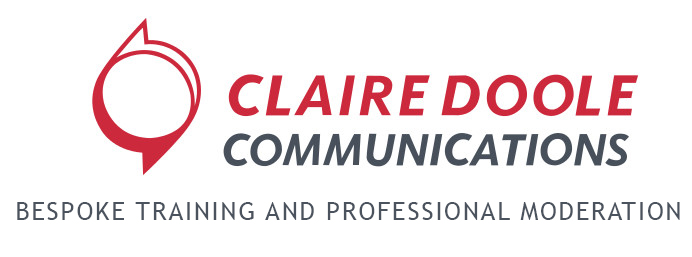
by Claire Doole | Jun 28, 2023 | Blog, Moderating
Many of us are visual learners and images definitely aid recall. So, it is surprising that not more event organisers engage graphic recordists.
They visually map conversations illuminating what is essential in real-time.
“People learn by looking and reading and they will remember things better if all of the senses are engaged”, says Carlotta Cataldi – who for the past 13 years has been bringing ideas alive visually at conferences and meetings.
Carlotta draws on paper, on what is called a knowledge wall, as well as digitally.
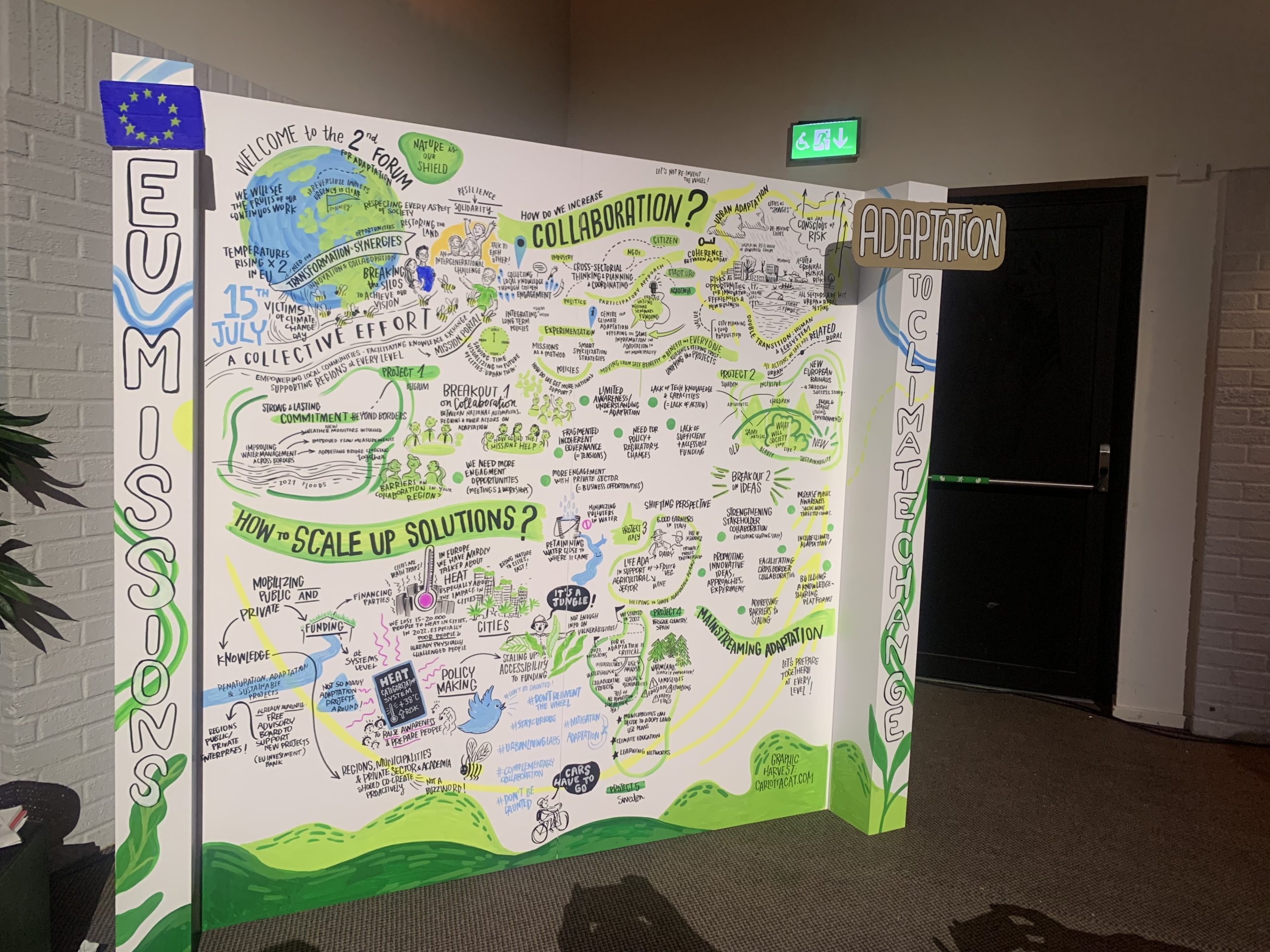
Having worked with her twice over the past few weeks at events where I was Master of Ceremonies, I saw how deeply she listens, and how rapidly she visualizes complex concepts.
She has developed her own language – bees represent a cross-pollination or cross- fertilization of ideas, a thermometer refers to rising heat in cities, while wellbeing is visualized not as a coin i.e. money but as a jewel.
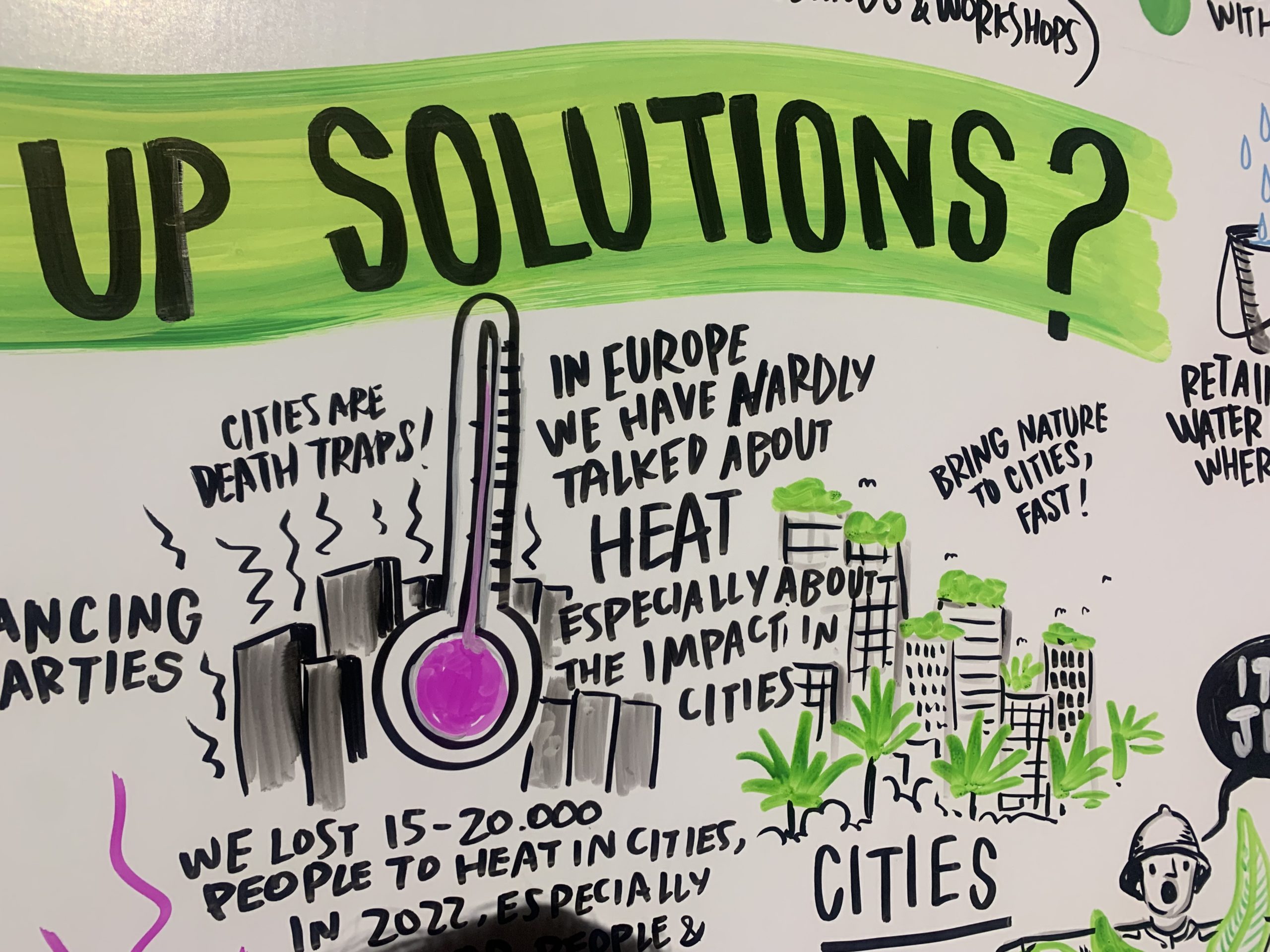
For the audience there are multiple advantages. It helps keep their minds focused on the content of the discussions. It helps to animate conversations, and provides them with an engaging visual summary of conference discussions to share with colleagues and on their social media channels.
A resource for organisers and the Master of Ceremonies
As a Master of Ceremonies or panel moderator, you are trying to bring clarity to the conversation in real-time. Carlotta goes one step further and turns that clarity into something visual – a mix of images and key messages.
It is, however, a team effort. I always introduce the graphic recordist to the audience at the start of an event and then, depending on time, I bring them in before coffee breaks and lunch and at the end of the day.
Sometimes, I may even ask the recordist to join me on stage to tell us what was important for them in the conversation. Each time, I am encouraging the audience to go and see what the recordist has done as this reinforces engagement.
At an event for Better Cotton last week where I was the Master of Ceremonies, we went one step further and encouraged the audience to write their insights or questions on post-its and tell us if anything was missing from the board or anything they wanted to draw.
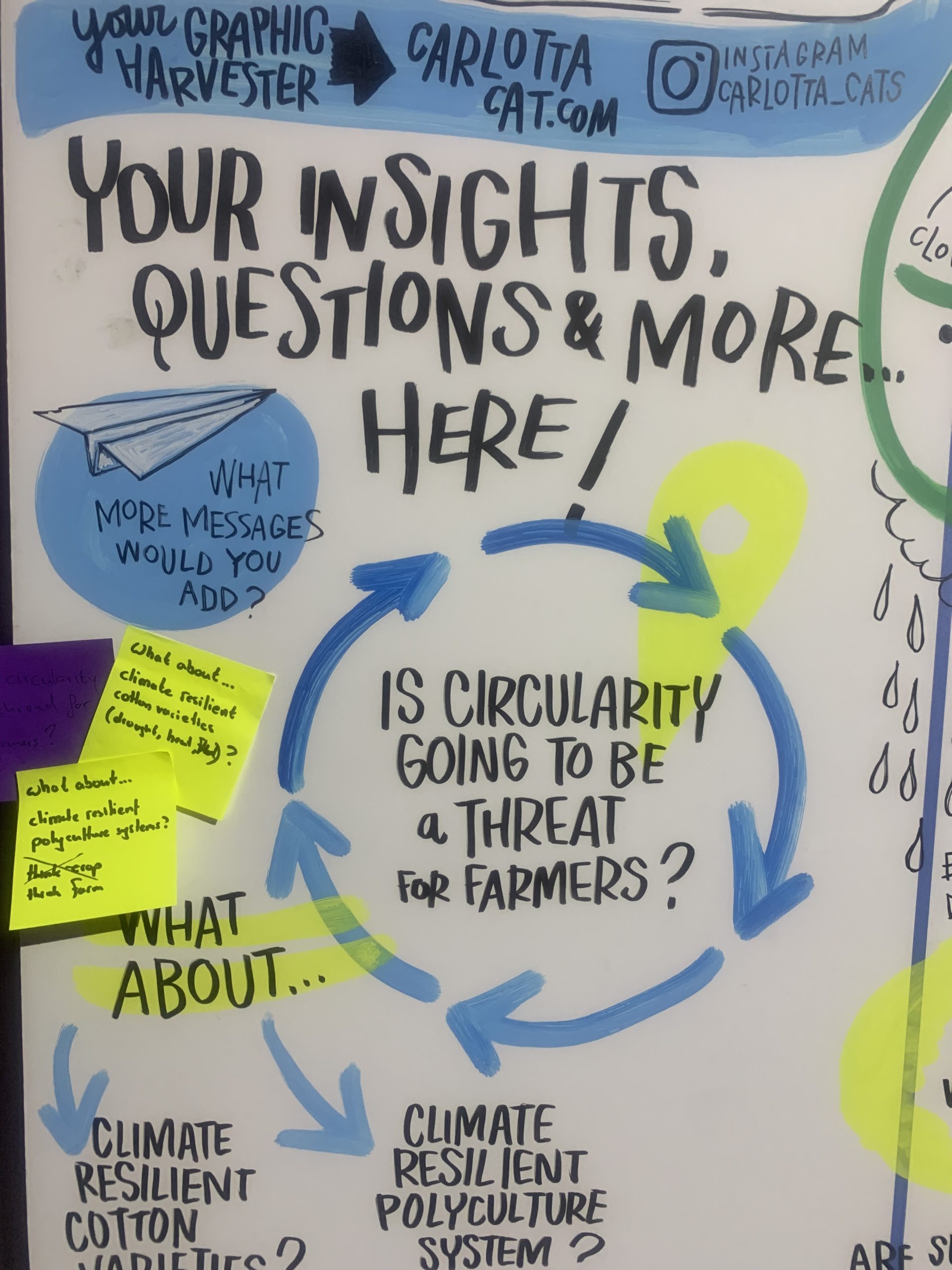
Organizers can often underestimate an audience’s need to be entertained and to participate in the conversation. Engaging a graphic recordist is a great way to ensure audience participation and make the event is more audience-centric and memorable. The images also are a great resource for post-conference reports and can be digitalized for use in PowerPoint presentations and webinars.
“I love my profession”, says Carlotta, “as it brings beauty and natural curves, a human touch to a business event.”
Claire Doole runs workshops on how to organise events and moderate panel discussions.
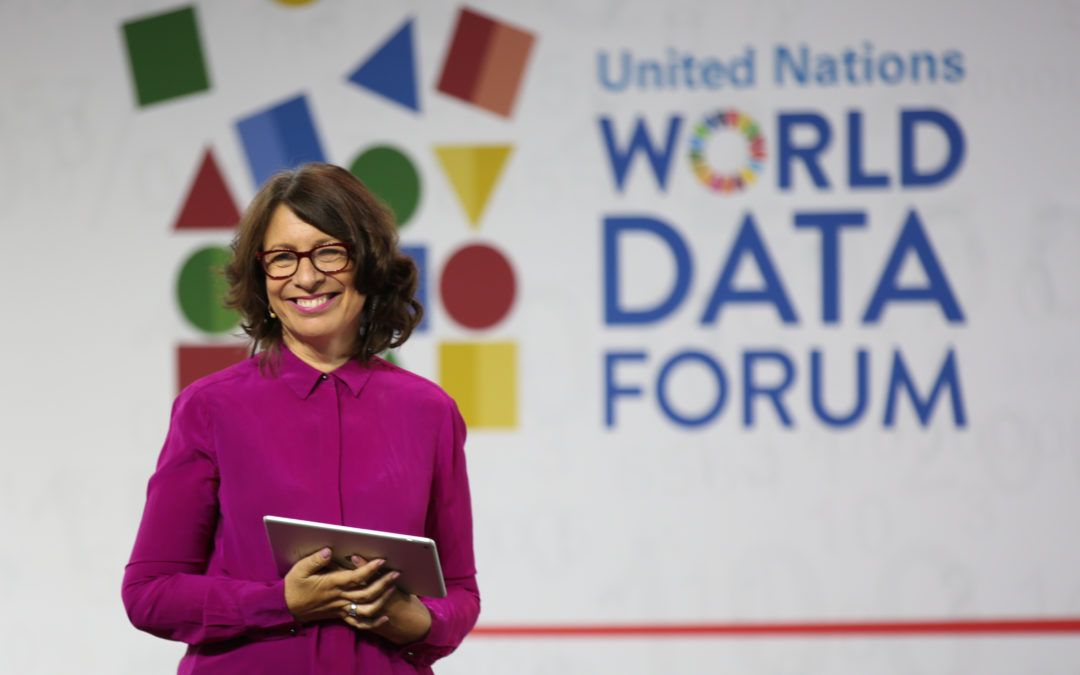
by Claire Doole | May 1, 2023 | Blog, Moderating
As soon as the sound failed in the opening video, I knew the conference would be rock and roll. Fortunately, I had insisted on an earpiece. I told the hastily assigned director to put the video volume up and he subsequently told me in my earpiece when the last-minute replacement for the opening speaker had entered the room. In fact, he arrived too late to start the conference. It was just as well that I had minutes beforehand lined up the second speaker to open it.
And that is how the day went, constantly adapting the programme when speakers didn’t turn up, physically changing the number of chairs on the stage before each session and repeatedly checking the number of available microphones and whether they worked.
In theory, acting as the Master of Ceremonies,(MC) is less work than moderating panel discussions, which take a lot of preparation to do well. An MC’s job is to make sure the event goes smoothly, linking the sessions and speakers and engaging the audience.
But if there has been no technical rehearsal the day before, and the team is a team of experts in their field but not in organising events – a situation I often face – the MC can find themselves in charge of a salvage operation – papering over the editorial and logistical cracks on the day as best they can.
So, here are my top tips for event organisers on what to look for or do when engaging a Master of Ceremonies:
• Bring in the MC a couple of months beforehand. An MC can advise on the event flow editorial narrative and how to make the programme interactive and varied. As I have said before, it is hard to manage the audience attention span when there is one speech or presentation after another, often with no editorial coherence or one-panel discussion after another, which has the same format. (See my blogs on panel moderation here)
• Brief the MC on the overall purpose of the event, each session’s objectives, and the speakers’ rationale and structure so he or she can clearly communicate this to the audience. The MC is there to serve as a thread linking the content throughout the event.
• Make sure the MC is concise and compelling in his/her remarks. Audiences don’t like verbose MCs that take up too much space. The role is to facilitate, not dominate!
• Engage an MC who can weave a narrative through the event, clearly connecting the speakers and themes of different sessions.
• Check that the MC can improvise when faced with technical challenges or unexpected changes to the programme. Broadcast journalists are usually adept at this as they are used to keeping the show on the road.
• Engage someone with great time management skills as audiences appreciate an event that is kept on track and to time.
• Hire an MC who can handle questions from the audience with aplomb. They must be encouraging yet control the situation if the question is unclear, too long or not a question but a long-winded comment.
• Search for an MC with high energy levels, an ability to connect with the audience and a sense of humour. The latter is particularly important when faced with technical gremlins, speakers that go over time or audience members who can’t ask concise questions.
• Organise a technical rehearsal the day before the event, as anything that can go wrong will go wrong (Murphey’s Law).
Once, a jury member at an awards ceremony I was hosting was on the verge of announcing the winner – not realising that his role was to only talk about the selection process and that it was the European Commissioner – sitting in the front row – who would do the honours.
Fortunately, I managed to stop him before he named the winner – and the award (unlike at that infamous Oscars ceremony) was given to the right person at the right time!
If you would like advice on organising an event, do get in touch, as I run in-person and virtual workshops to ensure your event is engaging and insightful.
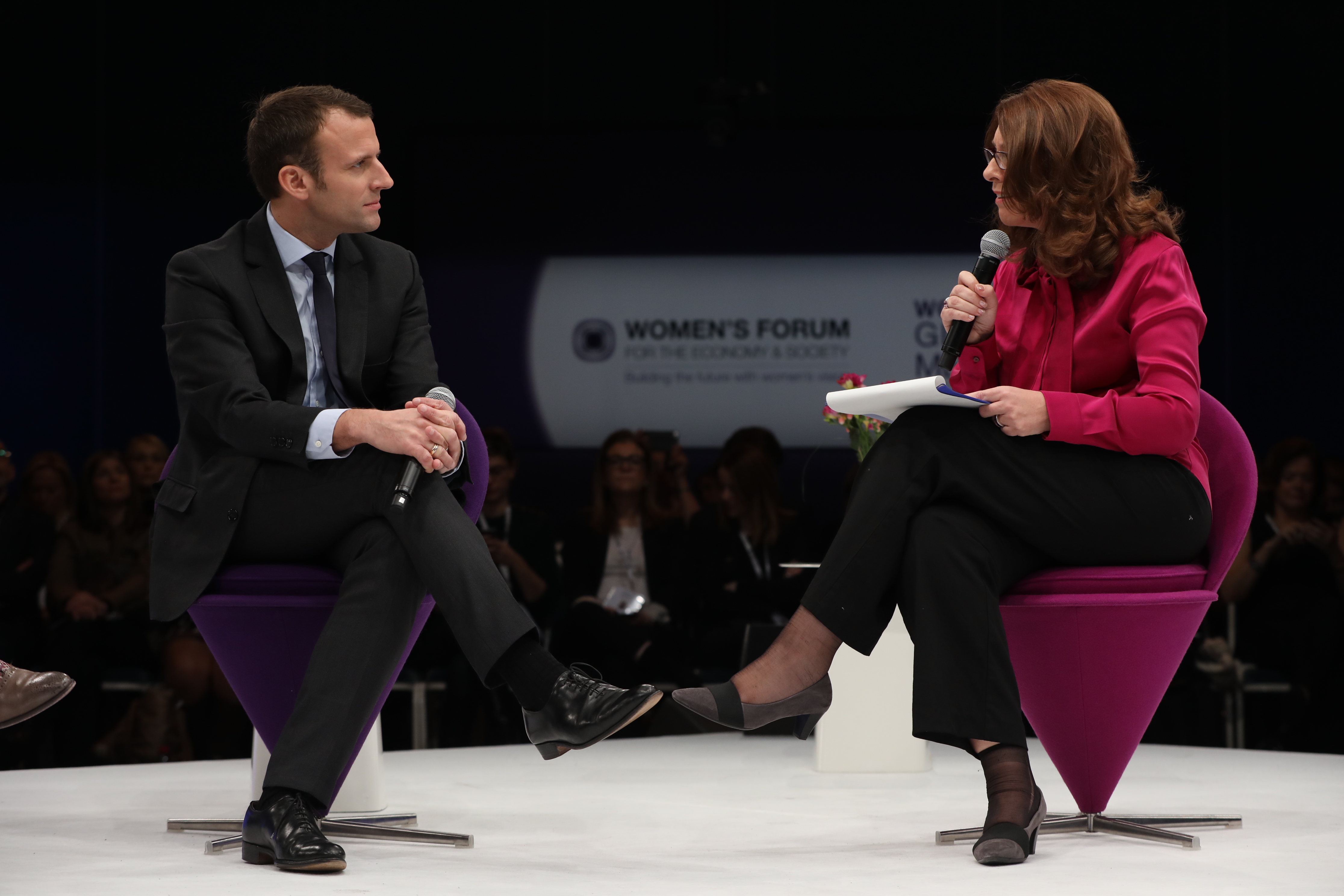
by Claire Doole | Dec 23, 2016 | Blog, Moderating
Emmanuel Macron, the French presidential hopeful, was getting ready to take the stage, and all I knew as panel moderator was that he was meant to sit in the chair second to the left.
He and I were taking part in the Women’s Forum for Economy and Society in Deauville. I had no idea what he would say on our panel discussion about the economic advancement of women. His PR team were nowhere to be found.
So when the makeup artist whispered to her colleague that she was about to go upstairs to do his make-up, I followed her into the inner sanctum.
I needed to know if he was willing to speak in English – a red line for some French politicians – or whether he would be speaking through an interpreter. I wanted to briefly introduce myself and the first topic for discussion – the gender pay gap between men and women. From experience, I know it is important to build rapport with high-level panelists, and to sense if they get my British humour.
He did – peering over my clipboard and asking what questions I would be posing – in perfect English.
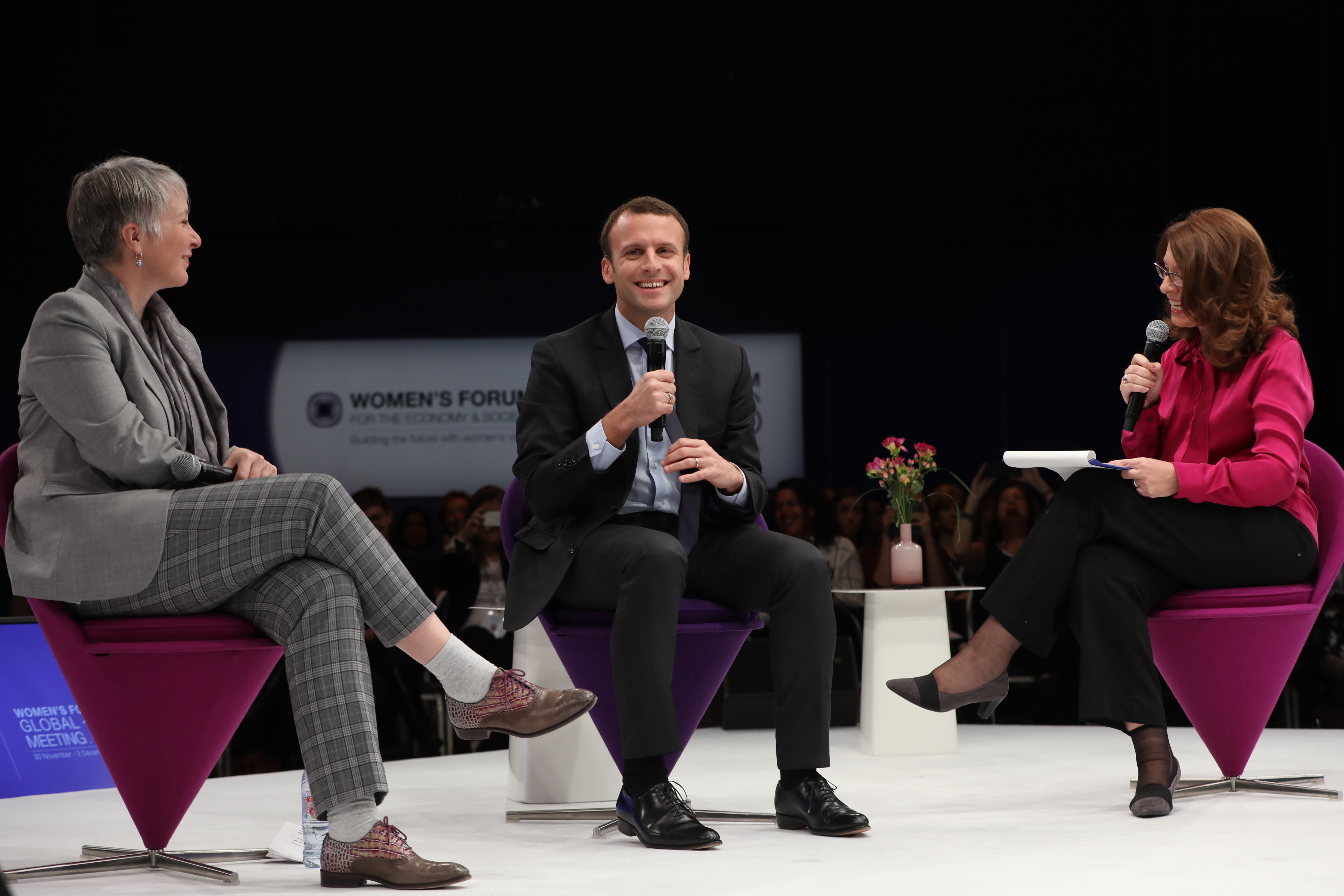
Patty Hajdu, Canada’s Minister for Women, Emmanuel Macron, French Presidential Candidate, Claire Doole, Moderator.
He was a master communicator. He understood the audience and did not dominate. He accepted graciously the business card I gave him from the founder of a feminist group I had met the previous night. She had calculated that at the current rate of progress women in France would be paid the same as men in 2186!
He even understood my humour as I asked him if he was or had ever been a feminist.
It was a sound bite that worked for him too as it went viral on Twitter.
All of this with no preparation from his PR team. The communications teams for the other panelists – Patty Hajdu, Canada’s Minister for the Status of Women, and Arancha Gonzalez, Executive Director of the International Trade Centre – had been very helpful with background information.
If you are going to successfully moderate high level panels, you do need to prepare. You have to do your homework as an advanced briefing from PR teams does not always happen. However, if you do meet with panelists’ PR teams be wary, they might try to stifle debate! The day before meeting Macron, I moderated a panel with the CEO of Coca Cola, Muhtar Kent, on why he was a feminist.
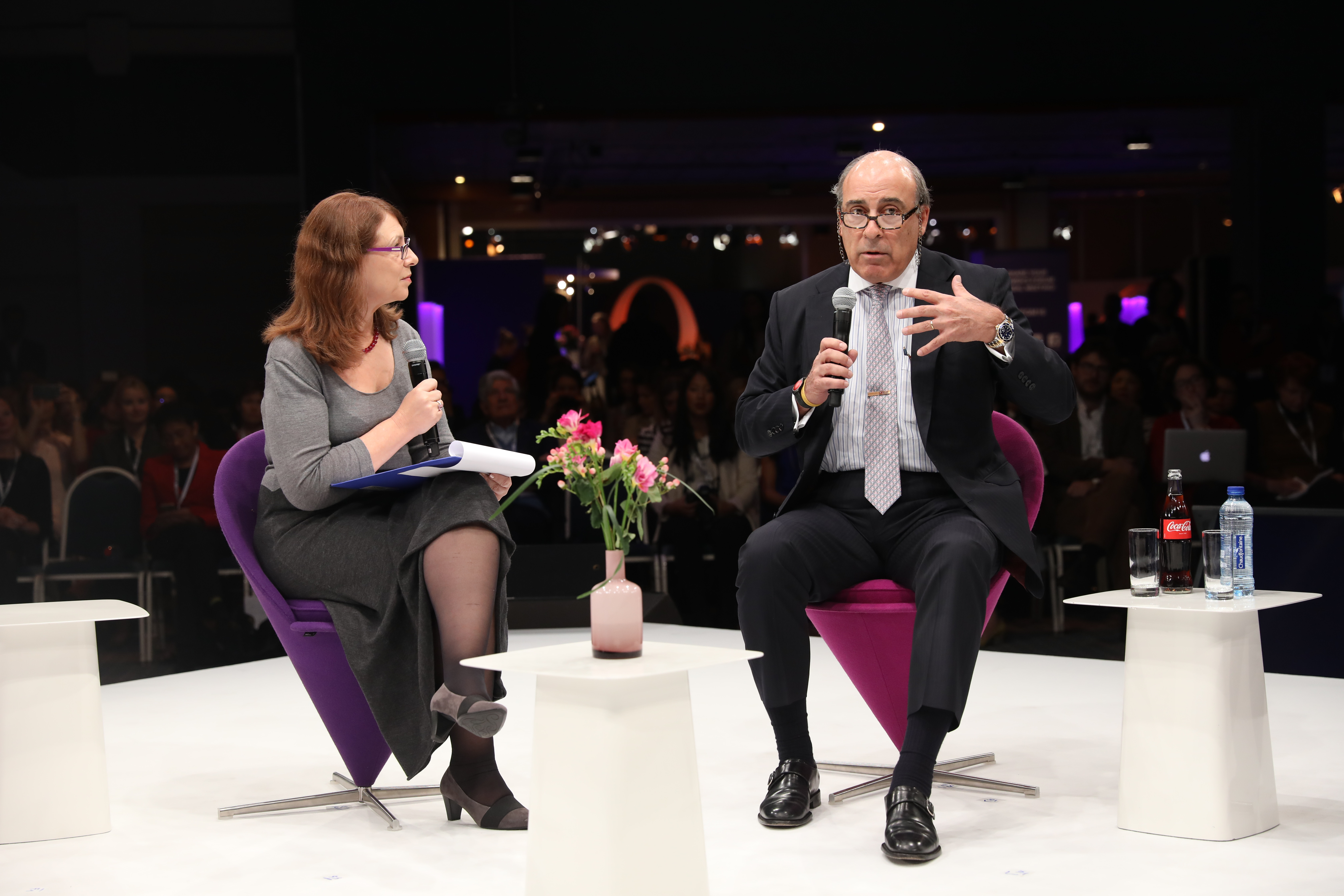
Interviewing the CEO Coca Cola Muhtar Kent about why he says he is a feminist.
Mr Kent’s PR team were much more controlling – keen to know my questions and those of the other two women who were on the panel. I gave them broad areas.
With hindsight, I can understand why they asked. He resigned as CEO 7 days later after what the Wall Street Journal called “a rocky eight-year run at the top”.
During that time, he had doubled the number of women on the Board of Directors from two to four, but parried my question on when there would be gender parity on the 14-member board with the word – “soon”.
He saw the event as a win-win to explain how Coca-Cola was empowering women in the countries where it operates. He even managed some product placement much to my chagrin, a photo reproduced in Forbes and Grazia magazines.
Hot on the heels of these panels in Deauville, I was asked, at one of the moderating workshops I run, for my 5 top tips on handling high -level panels.
Here they are:
• Be prepared, but ready to go with the flow
• Build rapport even if you only have a couple of minutes beforehand
• Listen intently and ask follow-up questions
• Ask the questions the audience wants asked
• Don’t be swayed by the PR team!
Interested in watching the whole debate? Here is the panel with Emmanuel Macron, Patty Hajdu and Arancha Gonzalez on the economic advancement of women.
And if you would like to find out why the CEO of Coca-Cola, Muhtar Kent says he is a feminist, click on this link.




